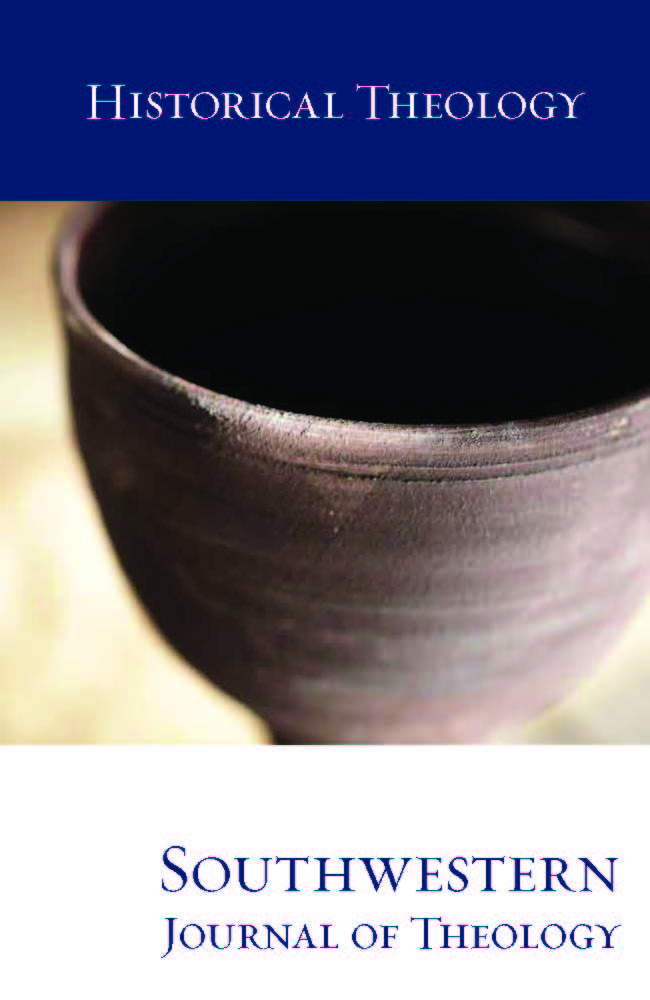
Historical Theology
Southwestern Journal of Theology
Volume 57, No. 2 – Spring 2015
Managing Editor: Terry L. Wilder
David W. Jones. Nashville: B&H Academic, 2013. xi+226 pages. Paperback, $24.99.
This is David Jones’ sixth book in the field of Christian ethics. Before this he has written on ethical issues such as marriage and family, usury, and the prosperity gospel. Much like his previous works, An Introduction to Biblical Ethics makes a solid contribution to the field. Jones is an Associate Professor of Christian Ethics at Southeastern Baptist Theological Seminary who writes from an evangelical perspective with a theological approach to ethics. The purpose of An Introduction to Biblical Ethicsis to provide a foundational overview of a bibliocentric, theologically conservative Christian ethic.
Jones’ approach is consistent with the best biblical ethics texts: he focuses on the development of an ethical system instead of casuistically assessing a list of contemporary concerns. Instead of attempting to merely exegete a handful of passages from the Bible in order to immediately apply them to ethical issues, Jones lays a foundation for ethics based on an authoritative, inerrant Bible. He shows how the moral law, as exemplified by the Decalogue, is foundational for Christian ethics, which, when combined with his three-part ethical schema, allows the reader to successfully interpret and apply Scripture to ethical issues. Like John Frame, Jones argues for three aspects that should be considered in ethical decisions, though Jones uses the categories of conduct, character and goals instead of Frame’s tri-perspectival terminology. In many ways, An Introduction to Biblical Ethics represents the best aspects of Frame’s Doctrine of the Christian Life, but in about a quarter of the length.1
This book consists of nine chapters, each chapter contributing to the discussion of the role of Scripture in Christian ethics. The first five chapters are foundational in nature; the final four chapters consist of an exposition of the Decalogue in relation to Christian ethics. In chapter 1, Jones begins by laying groundwork for ethics in general and briefly explaining different approaches to ethics. Jones begins with a working definition, “Biblical ethics is the study and applications of the morals prescribed in God’s Word that pertain to the kind of conduct, character, and goals required of one who professes to be in a redemptive relationship with the Lord Jesus Christ” (6). He uses this definition as a backbone for the first five chapters, explaining the clauses and terms in turn. The second chapter offers an overview of the nature of revelation, explaining how both general and special revelation play a role in ethics, but arguing for the primacy and sufficiency of Scripture for moral decision making. Chapter three argues for the unity of the canon, supporting the usefulness of both the Old and New Testaments as sources for Christian moral norms. In this discussion, Jones provides a concise introduction to the various positions on continuity of Scripture and the reformed understanding of the tri-partite division of the Old Testament law. The fourth chapter explains the coherency of Scripture, making a case for a non-conflicting absolutist approach to moral theology. Concluding the foundational section, in chapter 5, Jones explains how the moral law, particularly as framed in the Decalogue, can be used for making ethical decisions when it is applied through Jones’ three part ethical schema.
The sixth through eighth chapters are an introduction to the Decalogue as a paradigm for Christian ethics, reflecting Jones’ understanding that the Ten Commandments summarize the nature of God’s moral law and are an expression of God’s own character. In chapter 6, Jones provides a background for the delivery of the Decalogue, its varied ordering in different traditions, and the context of the Ten Commandments found in its prologue (i.e., Ex 20:2). Chapter 7 gives an overview of the various topics that are addressed from the moral law recorded in the first four commandments, which tend to be focused on the human-divine relationship. The eighth chapter explains the implications of the last six commandments of the Decalogue, which emphasis morality in human-human relationships. The book concludes with a brief chapter tying the themes together and emphasizing the importance of biblical ethics for faithful Christians.
Jones is successful in his attempt to produce an effective and interesting introduction to the discipline of biblical ethics. The book assumes the reader does not have a background in moral theology or philosophical approaches to ethics, but begins the explanation at the ground floor. Each chapter has a brief outline summary and the book includes a glossary with essential theological and ethical terms. Jones’ lucid writing style combined with the glossary and chapter summaries make this book a good option for collegiate ethics courses or use in the local church. Additionally, while many other introductory-ethics texts emphasize a topical approach to Christian ethics, Jones provides an ethical methodology which can be applied beyond particular case studies, which often become dated and irrelevant. This makes An Introduction to Biblical Ethics a text that should be helpful for years to come.
While the provision of a methodology is very helpful and will add to the longevity of the text, this book would have been better for the addition of a few more examples of the application of the ethical schema; there are too few specific examples in the text. Taken as a whole, this lacuna seems to be the most significant weakness of an otherwise excellent text.
An Introduction to Biblical Ethics is a well-written contribution to the field of Christian ethics, and an invaluable resource for those interested in biblical ethics. The book’s accessibility, biblical faithfulness, and structure make it an excellent introductory text at a graduate or undergraduate level and a helpful addition to the library of a pastor or scholar.
- John Frame, Doctrine of the Christian Life (Phillipsburg, NJ: P&R, 2008). ↩︎





